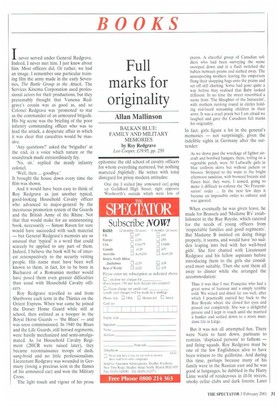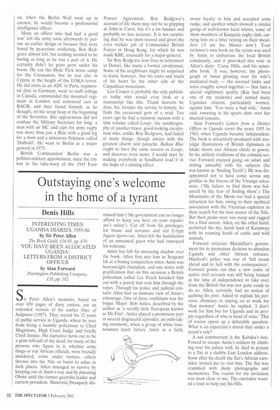Full
marks for
originality
Allan Mallinson
BALKAN BLUE: FAMILY AND MILITARY MEMORIES by Roy Redgrave Leo Cooper, £19.95, pp. 250 Inever served under General Redgrave. Indeed, I never met him. I just knew about him. Most officers did. Or rather, we had an image. I remember one particular training film the army made in the early Seventies, The Battle Group in the Attack. The Services Kinema Corporation used professional actors for their productions, but they presumably thought that Vanessa Redgrave's cousin was as good as, and so Colonel Redgrave was 'promoted' to star as the commander of an armoured brigade. His big scene was the briefing of the poor infantry commanding officer who was to lead the attack, a desperate affair in which it was clear that casualties would be massive.
'Any questions?' asked the 'brigadier' at the end, in a voice which nature or the soundtrack made extraordinarily fey.
'No, sir.' replied the manly infantty colonel.
'Well. then ... goodbye.'
It brought the house down every time the film was shown.
And it would have been easy to think of Roy Redgrave as just another typical, good-looking Household Cavalry officer who advanced to major-general by the incestuous promotion system of the Guards and the British Army of the Rhine. Not that that would make for an uninteresting book, necessarily — Simon Raven for sure would have succeeded with such material — but General Redgrave's memoirs are so unusual that 'typical' is a word that could scarcely be applied to any part of them. Indeed, I believe the book will be of interest retrospectively to the security vetting people. His name must have been well known to them, in fact, for to be born in Bucharest of a Romanian mother would have posed them even greater difficulties than usual with Household Cavalry officers.
Roy Redgrave travelled to and from Sherborne each term in the Thirties on the Orient Express. When war came he joined the Dorset Home Guard while still at school, then enlisted as a trooper in the Royal Horse Guards — 'the Blues' — and was soon commissioned. In 1940 the Blues and the Life Guards, still horsed regiments, were hastily mechanized and semi-amalgamated. As 1st Household Cavalry Regiment (2HCR were raised later), they became reconnaissance troops of dash, sang-froid and no little professionalism. Lieutenant Redgrave was wounded in Germany (losing a precious icon in the flames of his armoured car) and won the Military Cross.
The light touch and vigour of his prose
epitomise the old school of cavalry officers for whom everything mattered, but nothing mattered frightfully. He writes with total disregard for prissy modern attitudes:
One day I stalled [my armoured car] going up Guildford High Street, right opposite Woolworth's outside which were lots of prams. A cheerful group of Canadian soldiers who had been surveying the scene swooped down and in a flash switched the babies between prams and melted away. The unsuspecting mothers leaving the emporium flung their shopping bags onto the prams and set off still chatting, Some had gone quite a way before they realised that Baby looked different In no time the street resembled a scene from 'The Slaughter of the Innocents', with mothers running round in circles holding red-faced screaming children in their arms. It was a cruel prank but I am afraid we laughed and gave the Canadians full marks for originality.
In fact, girls figure a lot in the general's memories — not surprisingly, given the indelible sights in Germany after the surrender:
As we drove past the wreckage of fighter aircraft and bombed hangars, there, toiling on a vegetable patch. were 50 Luftwaffe girls in blue uniform skirts but without jackets or blouses. Stripped to the waist in the bright afternoon sunshine, with bronzed breasts and flaxen hair, they were. I sensed, going to make it difficult to enforce the 'No Fraternisation' order ... In the next few days it became an impossible order to enforce and was ignored.
When eventually he was given leave, he made for Brussels and 'Madame B's' establishment in the Rue Royale, which catered for the needs of young officers from 'respectable families and good regiments'. But Madame B insisted on doing things properly, it seems, and would have `no sudden leaping into bed with her well-bred girls'. She first chatted with Lieutenant Redgrave and his fellow aspirants before introducing them to the girls she considered most suitable. Then she sent them all away to dinner while she arranged the accommodation:
Thus it was that I met Francoise who had a great sense of humour and a simply terrible cold. We wined and dined far too well, after which I practically carried her back to the Rue Royale where she closed her eyes and passed out completely. She was a delightful person and I kept in touch until she married a banker and settled down to a more mundane life in Liege.
But it was not all attempted fun. There were Nazis to hunt down, partisans to restrain, 'displaced persons' to fathom — and firing squads. Roy Redgrave must be one of the few Englishmen alive to have been witness to the guillotine. And during this time, perhaps because many of his family were in the Russian east and he was good at languages, he dabbled in the Harry
Lime world of rendezvous in streets, smoky cellar clubs and dark forests. Later on, when the Berlin Wall went up in earnest, he would become a professional intelligence officer.
Many an officer who had had 'a good war' left the army soon afterwards to pursue an earlier design or because they were bored by peacetime soldiering. Roy Redgrave almost left, but nothing seemed to be boring as long as he was a part of it. He certainly didn't let grass grow under his boots. He ran the Hyde Park horse camp for the Coronation, but he was also in Cyprus at the height of the EOICA terror. He did stints as an ADC in Paris, regimental duty in Germany, went to staff college in Canada, commanded the mounted regiment in London and armoured cars in BAOR, and then found himself, as he thought, on the scrap heap at the beginning of the Seventies. But appearances did not confuse the Military Secretary for long: a man with an MC and caps for army rugby was more than just a Blue with a good leg for a boot and a miniature Pekinese called 'Daffodil'. He went to Berlin as a major general in 1975.
British Commandant Berlin was a politico-military appointment, since the city was in the time-warp of the 1945 Four Powers Agreement. Roy Redgrave's account of life there may not be as gripping as John le Carte, but it's a lot funnier and probably no less accurate. It is not surprising that he was short-toured and given the even trickier job of Commander British Forces in Hong Kong, for which he was made KBE, unusually for a major-general.
Sir Roy Redgrave now lives in retirement in Dorset, like many a former cavalryman. Some of his neighbours might be surprised to learn, however, that his roots and much of his heart lie the other side of the Carpathian mountains.
Leo Cooper is probably the only publisher today who would even look at a manuscript like this. Thank heavens he does, for, besides the service to history, he finds the occasional gem of a read. Ten years ago he had a runaway success with a slim volume called Loopy, the autobiography of another brave, good-looking cavalryman who, unlike Roy Redgrave, had failed at many things, though always with the greatest charm and panache. Balkan Blue ought to have the same success as Loopy, and deserves even more. I would start by making everybody at Sandhurst read it in the hope of a cloning effect.



























































 Previous page
Previous page